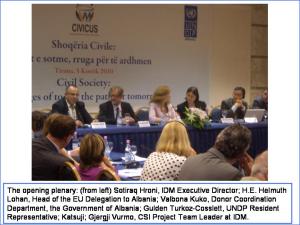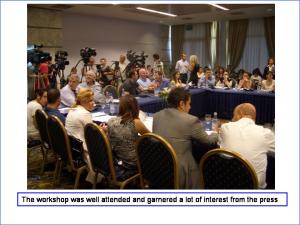V.Finn Heinrich, CSI’s friend and until the end of 2006 CIVICUS’ Director of Programs, has published online his doctoral dissertation “What Makes Civil Society Strong?“.
The study addresses the most important research questions facing civil society scholars and practitioners today, i.e.
- How to conceptualize and measure civil society?
- How to explain the different strengths of civil societies across the world?
- How to support efforts to strengthen civil society?
The entire dissertation can be downloaded clicking here
Abstract of Dissertation: “What Makes Civil Society Strong?”
How to conceptualise and measure civil society and how to understand its development over time are two of the most prominent research questions facing civil society scholars today. It seems that the first issue – i.e. lack of an appropriate measure of civil society – is a key obstacle for addressing the second research gap – i.e. identifying civil society’s enabling conditions and causes – and that the two questions are inextricably linked.
Using a new data source and employing an innovative combination of mutually complementary analytical approaches, the dissertation engages with both research questions. First, identifies an operational concept and measurement model for the strength of civil society, which is suitable for comparative international research. Second, making use of the measurement of civil society’s strength in 43 countries, identifies those factors which “make civil society strong” via a combination of analytical tools, i.e. regression analysis, fuzzy-set analysis and a theoretical exploration of the main processes which drive civil society’s development.
The thesis’ first component of conceptualising, operationalising and measuring civil society is approached via an in-depth exploration of the current state-of-the-art regarding civil society concepts. This leads to the identification of a concept of civil society’s strength based on two dimensions: structure and values (and its operationalization via dimensions and indicators). Using data stemming from the CIVICUS Civil Society Index Project, a measurement of civil society’s strength in 43 countries is put forward. The high validity and robustness of this measurement is demonstrated through comparison with existing measures and tests against critical country cases.
The second part of the thesis employs this measurement to examine the causes for civil society’s strength, recognizing that the limited validity of existing measures has been a key factor in the lack of a consolidated body of scholarship on the driving factors of civil society’s development. The causal analysis uses a hypothesis-testing approach by first exploring the explanatory power of each of the major theories which concerns itself with civil society’s development, ranging from modernization theory, political culture approaches, social origins theory and historical institutionalism to actor-centered approaches. It then proceeds to multivariate regression models as well as fuzzy-set analysis, which provides a complementary approach to regression analysis by allowing for complex combinations of causal factors and multiple pathways towards a strong civil society.
The key finding – emerging from both regression and fuzzy-set analysis – concerns the power of historical factors in explaining the strength of civil society today. It suggests that the length of a country’s democratic experience is particularly relevant for civil society’s development. This main result of the causal analysis is further put to the test via endogeneity tests and via a theoretical exploration of the specific causal processes which are likely to be at play between a country’s democratic and civic development. Both tests further strengthen the robustness of the findings.
Equipped with wide-ranging and highly robust results regarding the applicability of the civil society concept to empirical research, concerning the varying strengths of civil societies around the world, and on the key driving factors of civil society’s development, the final section of the dissertation explores the implications of these results for research, policy and practice.






